Everything You Need to Know About Renting an Airbnb in Cuba
This story is part of a weeklong Yahoo series marking one year since the opening of relations between the United States and Cuba.
HAVANA — In the coming year, 1.8 million American tourists are expected to pile on top of the 3 million non-Americans who already visit Cuba each year. But here’s the big question: Where will everyone stay?
There are roughly 61,000 hotel rooms on the island. Anticipating the flood of American interest, tour groups have been booking blocks of hotels rooms into next year, making inventory scarce.
Enter Airbnb. The home-sharing service launched in Cuba in April, capitalizing on an existing culture of small-scale hospitality called casa particulars, where locals rent out rooms in their homes or entire residences. Since its launch, the company has quickly amassed almost 3,000 listings in Cuba — everything from single rooms to giant houses. Half of those listings are in Havana.
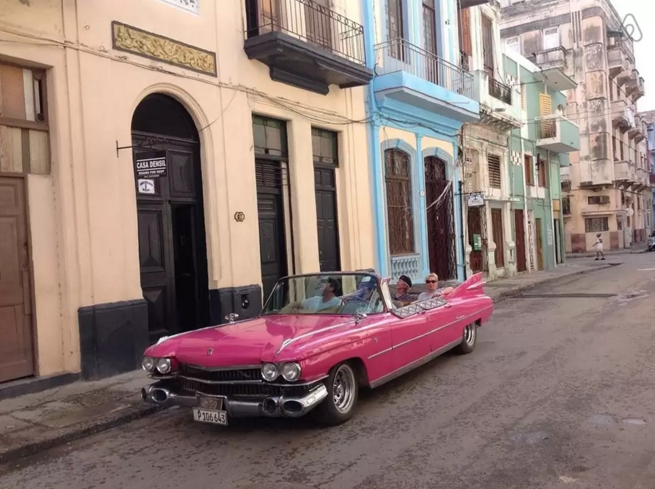
The exterior of Casa Densil, an Airbnb rental in Havana. (Photo: Airbnb)
When Airbnb invited a group of journalists to Havana this fall, I jumped at the chance to visit a country at the top of my bucket list. Transport and paperwork were arranged for us, and we were asked to book accommodations through Airbnb.
Related: A Reality Check for Visiting Cuba: Not All Cigars and Classic Cars
There are many traditional casa particular-style arrangements, where you can rent a room in a house. These are great for getting an authentic Cuban experience, sharing meals, and spending quality time with locals. Having gestured my way through countless awkward “family” dinners on study-abroad programs in my youth, however, I have become skeptical of forced cultural exchanges like this.
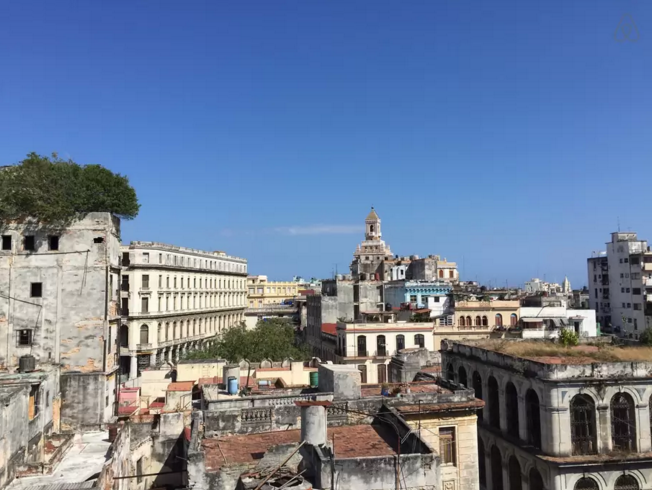
The rooftop view from an Airbnb rental in Cuba. (Photo: Airbnb)
For the more private traveler, there are a number of apartments and houses that you can take over. There are also a lot of ruffled satin bedspreads. (Part of the fun of picking an apartment is scoping out the design aesthetic of another country.)
I logged on to the site thinking I’d stay in Havana Vieja, which is close to the water and has the city’s biggest concentration of sightseeing spots. The neighborhood is also the best place to get a rental with Wi-Fi access, which is sparse throughout the rest of the city.
Instead, I opted for the Vedado neighborhood, a more modern and affluent residential area. And to be honest, when I read the words “Home to Cuba’s most famous ice cream shop, Coppelia,” the decision was made.
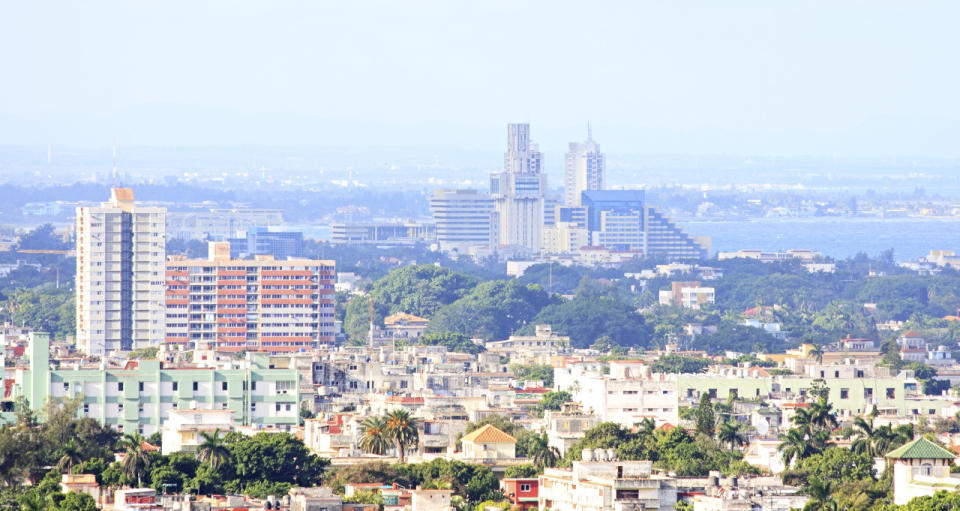
A view of Cuba’s Vedado neighborhood. (Photo: Thinkstock)
The average Havana Airbnb rental goes for $51. I set my price range from $75-$150, hoping to find a small private apartment (and too suspicious to go lower). One of the first to pop up — at the top of my price range — was called the Diana Luxury Apartment.
Related: 8 Things We’re Going to Do as Soon as We’re Able to Go to Cuba
With three bedrooms and two baths, it was bigger than I needed. The furniture had a cool modern look, mostly from IKEA, with some festive light fixtures and an Andy Warhol-style Marilyn Monroe poster. Both bathrooms looked recently renovated, and I spotted a balcony where I could enjoy my morning coffee with a view. It was a few short blocks from the Malecón, Havana’s picturesque seaside esplanade.
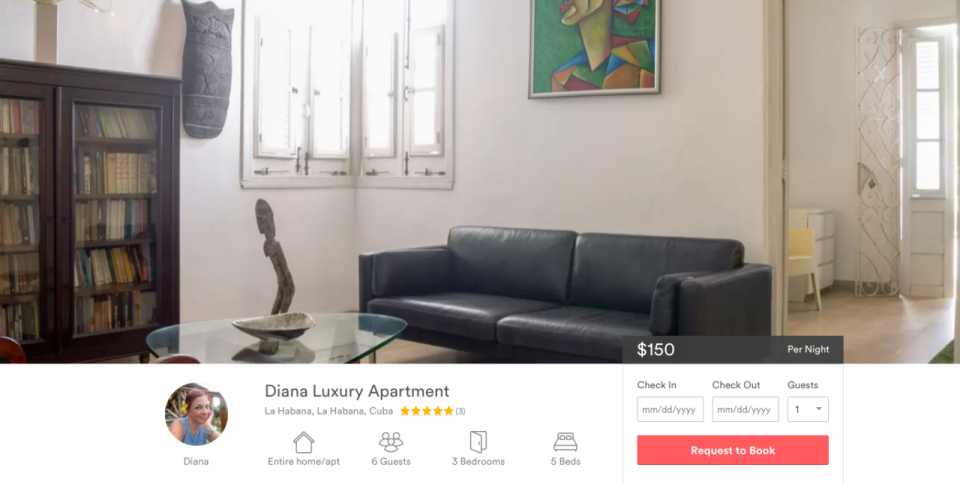
The listing for the Diana Luxury Apartment, where the author stayed. (Photo: Airbnb)
The next step was to book it. Even though Internet access is notoriously sparse in Cuba, Diana confirmed availability within the hour. She even offered to arrange a taxi to collect me at the airport, as most Cuban hosts do.
While you can still book lodging through the existing casa particular network, Airbnb hosts like the new system because they get paid in advance through the site. It can take 10 days for the money to make its long, winding conversion from dollars to local currency, but they are sure to get it. And they can charge cancellation fees.
Diana, who is one of the more popular hosts in the city, grants only a 50 percent refund if you cancel more than seven days beforehand, zero if you don’t show up after that.
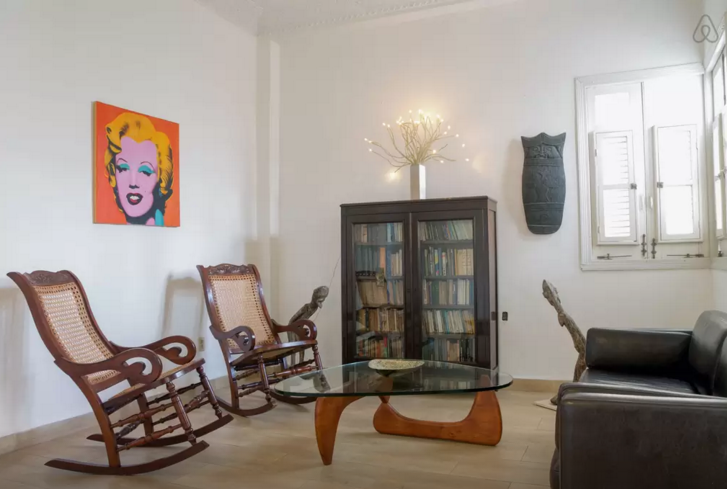
A shot of the apartment. (Photo: Lara Naaman)
Due to flight delays, I arrived in Havana more than an hour late. There was no cellular roaming or airport Wi-Fi, so I couldn’t let Diana know that I would be late to collect the key. Her property manager, Yunia, waited for me anyway. She let me in, showed me around (the pictures were very accurate), and took down information from my passport and visa, as required by Cuban law. I hadn’t requested any meal service, but my hosts left fresh fruit, bread, butter, and bottled water in the fridge. Yunia made sure I could work the phone and the locks, then left me with a list of emergency numbers. The apartment had plenty of windows, but it was humid enough outside that I decided to sleep in the bedroom with the very powerful air conditioner.
Conveniently, I was a block and a half from Calle 23, home to one of Havana’s five Wi-Fi access points. That doesn’t mean you can get Wi-Fi in the apartment (very few apartments in Havana have Internet access). But I was steps from the area known as La Rampa, where you can buy a Wi-Fi access card and join the throngs of locals leaning against walls, doing their Internet business (a sight in and of itself).
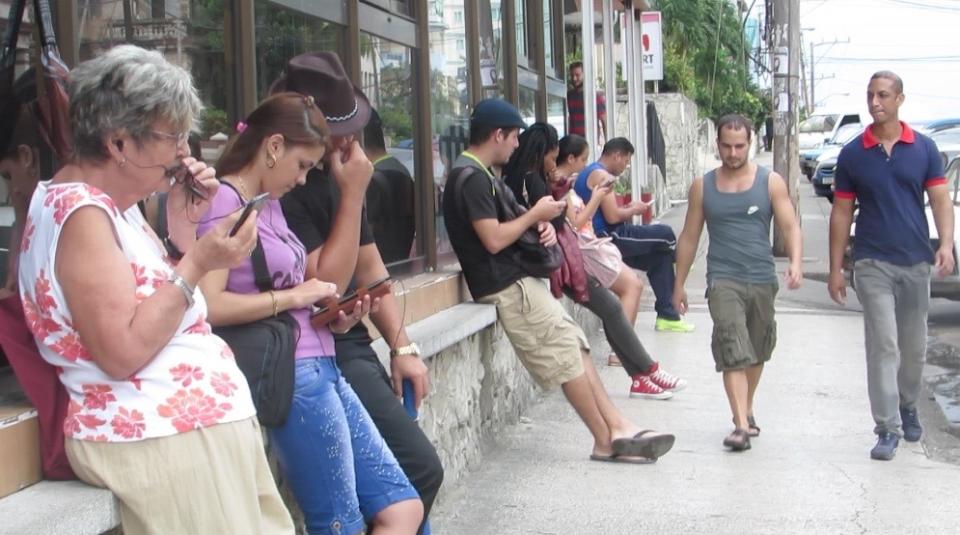
Locals waiting to use the internet in La Rampa. (Photo: Lara Naaman)
Now, as cool as my little Havana pied-à-terre looked, I soon discovered that it suffered from some problems that just have to do with Cuba being Cuba. The municipal plumbing hasn’t really been updated in over 50 years, so you have water issues. (This is even an issue in some top-tier hotels.) One morning, I just didn’t have hot water. But by the time I’d thrown dry shampoo in my hair, the downstairs neighbors had already discovered the problem and called Diana for me. Her industrious caretaker Yunia was dispatched to fix things as quickly as possible.
Another issue — which was no one’s fault but traumatic nonetheless — was a break-in perpetrated by a giant Cuban cockroach. As I stood on the balcony one morning, I felt what I thought was a leaf blow past my face. However, when I turned to look, I saw a three-inch long insect resting on its back. Naively hoping it was dead, I took a step toward it. Nope. Up it jumped, scurrying around the living room.
Related: Is Cuba Safe for Gay Travelers? What You Need to Know.
But in a country that’s kept classic cars in mint condition for half a century, there is always a creative solution. To my right, I spotted a collection of large, hardbound books in the bookshelf: the collected works of Vladimir Lenin. I gently eased Volume 3 off the shelf and hurled it at la cucaracha. I assume I won that fight — I have a rather dramatic phobia of roaches and couldn’t force myself to pick Vladimir back up for the rest of the trip. But still, it was the most culturally appropriate self-defense tool I’d used in all my travels.
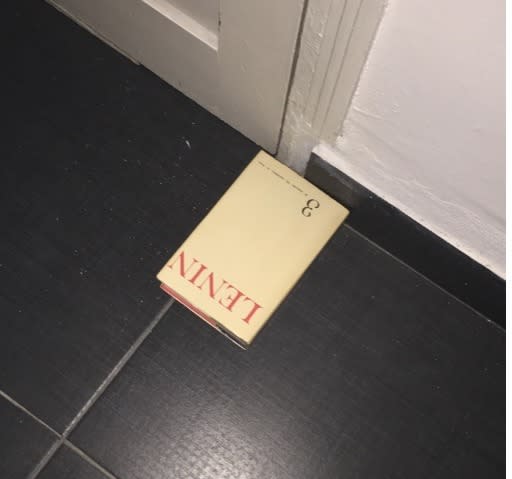
Death by Lenin. (Photo: Lara Naaman)
THE DETAILS
Cuba is a unique travel experience, no matter how you experience it. You won’t necessarily get the same comfy bed, friendly neighbors, or winged visitors that I had using Airbnb. But here are some pros and cons to know that will help you plan a trip to Cuba.
Airbnb pros
You can book easily online, and Airbnb has worked out an international system that secures payment of the host in advance. This is helpful since you can’t use credit cards or ATMs in Cuba — only cash.
You’re helping small businessmen and women. The average Cuban salary is $20 a month. Airbnb says the average Cuban host is making over $250 per booking. A lot of that money goes to making infrastructure improvements for future guests.
American tourists are, in a rare twist, actually preferred among the Airbnb hosts. “When Americans come, they are actually interested in us and our culture,” says Marta Vitorte, who hosts guests in her Vedado high-rise. “People from other countries are more interested in partying.”
You have a more authentic Cuban experience. Hosts have recommendations you’re not going to find in any guidebook. Host Dany Hernández, a former professional baseball player, loves taking his guests to a game and giving them the inside scoop. At Casa Densil, owner Ezio Romolo’s many musician friends will, on occasion, strike up an impromptu concert.
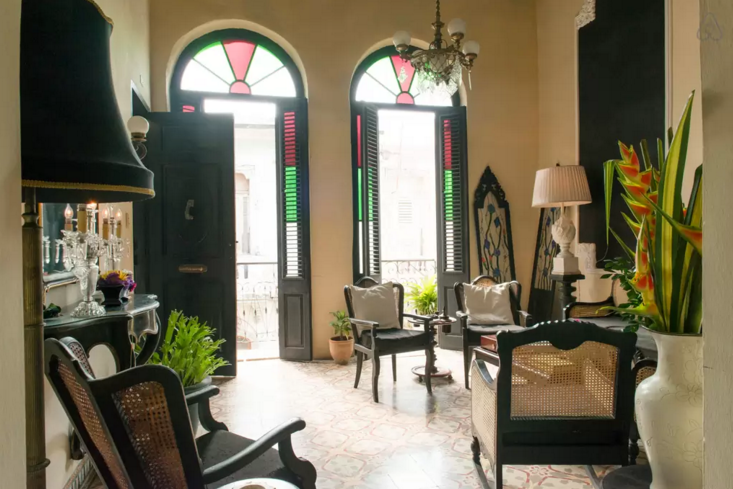
The living room of Casa Densil. (Photo: Airbnb)
Airbnb cons
You can use Airbnb only if you’re going to Cuba under one of the 12 legally approved travel categories — and tourism isn’t one of them. If you’re going the sneaky “via Mexico or Canada” way, you have to book a hotel or casa particular. You can’t use Airbnb.
Communication. English is not as widely spoken outside the hotels and main tourist areas. While some hosts speak a little English, fluency isn’t the sure thing it would be with hotel staff.
Read the listing carefully. Many listings rent out a room in a house — not the entire house. Hosts report that some American guests have turned up and been surprised to learn that they weren’t getting the house to themselves. There is usually a private bathroom and a secure lock, but you may have strangers staying close by.
The infrastructure problems you find in a hotel are magnified in a house, since there aren’t the same backup systems a hotel might have in place.
WATCH: Want to Travel Like a Local? Follow These Tips
Let Yahoo Travel inspire you every day. Hang out with us on Facebook, Twitter, Instagram, and Pinterest. Check out our original adventure travel series, “A Broad Abroad.” To learn more about Yahoo Travel’s travel policy please click here.


